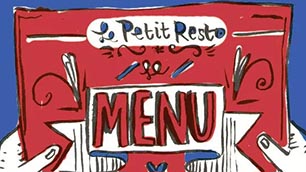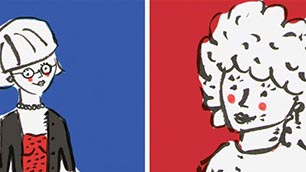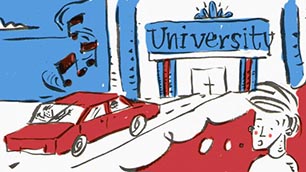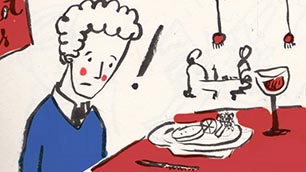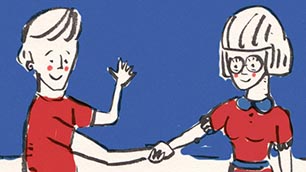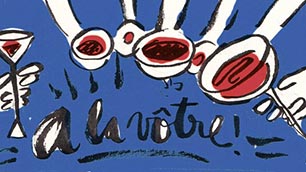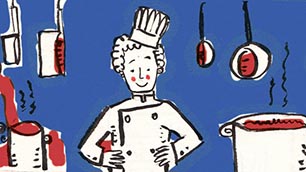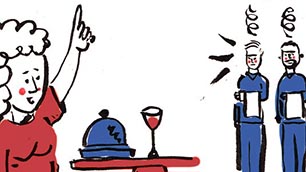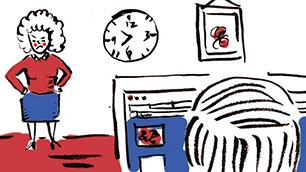| Valérie: | Now, la leçon de grammaire. Vous êtes prête ? |
| Michelle: | Oui, je suis prête. |
| Valérie: | The past two weeks, we’ve learned 2 irregular verbs, avoir et être. Today, we’re practicing using the first major group of regular verbs in French. All verbs of the first group verb... |
| Michelle: | ...have the -er ending in the infinitive. |
| Valérie: | Parfait Michelle. Let's see.....to speak? |
| Michelle: | Parler. |
| Valérie: | To like? |
| Michelle: | Aimer. Demander - to ask. Écouter - to listen. Regarder - to watch. |
| Valérie: | To live? |
| Michelle: | Habiter. |
| Valérie: | "H" is silent. Just pretend it’s not there. Habiter. |
| Michelle: | Habiter - to live, travailler - to work. |
| Valérie: | Bien. How would you say ‘I live in France’ ? |
| Michelle: | Je habite en France. |
| Valérie: | C’est bien, except what do you need to do when the verb starts with a vowel or a silent h? |
| Michelle: | Oh oui, I need to change the ‘je’ into ‘j with the little thingie next to it. |
| Valérie: | You mean the apostrophe, right ? |
| Michelle: | Oui ! |
| Valérie: | That’s right, l’apostrophe. So it’s not je habite, it’s... |
| Michelle: | J’habite. J’habite en France. |
| Valérie: | Parfait ! It’s not je ai... |
| Michelle: | J’ai. J’ai un rêve. |
| Valérie: | It’s not je écoute, it’s... |
| Michelle: | J'écoute. J’écoute Valérie. |
| Valérie: | Bien. Now Michelle, je conjugue le verbe parler pour vous: je parle, tu parles, il/elle parle, nous parlons, vous parlez, ils/elles parlent. A few endings sound the same but are written differently. |
| Michelle: | Very differently! It’s e, es, e, ons, ez, ent. |
| Valérie: | Right, Michelle. Vous conjuguez aimer - to like. |
| Michelle: | J’aime, tu aimes, il/elle aime, nous aimons, vous aimez, ils/elles aiment. |
| Valérie: | Parfait, you didn’t forget the élision and you even did the liaison with nous, vous, ils and elles. Félicitations ! Let’s practice a few affirmative and negative sentences now. |
| Michelle: | D’accord. J’aime la France. Il n’aime pas la France. Je parle français. Il ne parle pas français. Je cherche l'aventure. Il ne cherche pas l'aventure. |
| Valérie: | Parfait ! Continuez. |
| Michelle: | J’aime escargots, il n’aime pas escargots. Je déteste butter. Il aime butter, il adore butter! J'écoute musique classique, il écoute musique country. |
| Valérie: | Vous êtes différents ! |
| Michelle: | Nous sommes très différents. |
| Valérie: | We’ll practice more nous, vous, ils and elles a little later today. One more thing, Michelle, in French, we have to give the nouns an article, either indefinite or definite. |
| Michelle: | Oh, the articles confuse me un peu I have to say. |
| Valérie: | Then, let's talk about them more, d’accord ? |
| Michelle: | D’accord ! |




